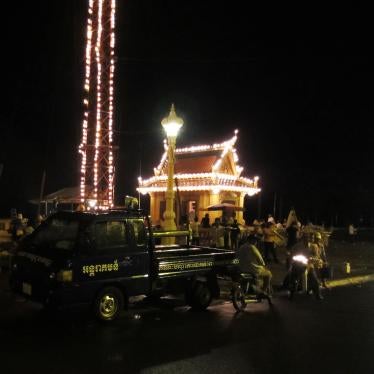(New York, January 21, 2014) – Cambodian authorities responded to peaceful protests against fundamentally flawed elections with excessive force and bans on demonstrations, Human Rights Watch said today in its World Report 2014.
“Cambodians have increasingly demonstrated a desire to exercise their basic rights in the face of an entrenched ruling party that shows no willingness to respect them,” said Brad Adams, Asia director at Human Rights Watch. “Most international donors, who provide much of the government’s budget, are still stuck in a ‘see no evil’ mentality that misses out on the Cambodian public’s dismay with persistent bad governance, corruption, and repression.”
In the 667-page World Report 2014, its 24th edition, Human Rights Watch reviews human rights practices in more than 90 countries. Syria’s widespread killings of civilians elicited horror but few steps by world leaders to stop it, Human Rights Watch said. A reinvigorated doctrine of “responsibility to protect” seems to have prevented some mass atrocities in Africa. Majorities in power in Egypt and other countries have suppressed dissent and minority rights. And Edward Snowden’s revelations about US surveillance programs reverberated around the globe.
Official results from the July 2013 elections returned to power the long-ruling Cambodian People’s Party (CPP), led by Prime Minister Hun Sen. Credible allegations of widespread election irregularities went uninvestigated by official election bodies, resulting in frequent and large in demonstrations led by opposition leader Sam Rainsy’s Cambodian National Rescue Party. Security forces repeatedly used excessive force to suppress post-election protests and social unrest.
An official moratorium on the granting of Economic Land Concessions for industrial-scale corporate agriculture on state lands did not prevent economically and politically powerful actors from seizing land from poor individuals and communities. Such land grabs have already adversely affected hundreds of thousands of Cambodians. Land disputes became continued in 2013, and the authorities brought legal proceedings against land rights defenders in government-controlled courts to punish them for their advocacy efforts.The CPP responded to the post-election unrest with a few gestures that appeared aims to assuage public and international opinion. For example, a court temporarily released prominent land rights defender Yorm Bopha on November 22 – but left her conviction on trumped-up charges intact pending further judicial review. At least five human rights defenders are serving prison terms and three others convicted in absentia face prison if apprehended.
“The CPP’s miniscule gestures combined with more violence and threats should not be taken as proof that it is ready to reform, but rather as evidence that more international pressure is needed to bring about human rights change,” Adams said.






